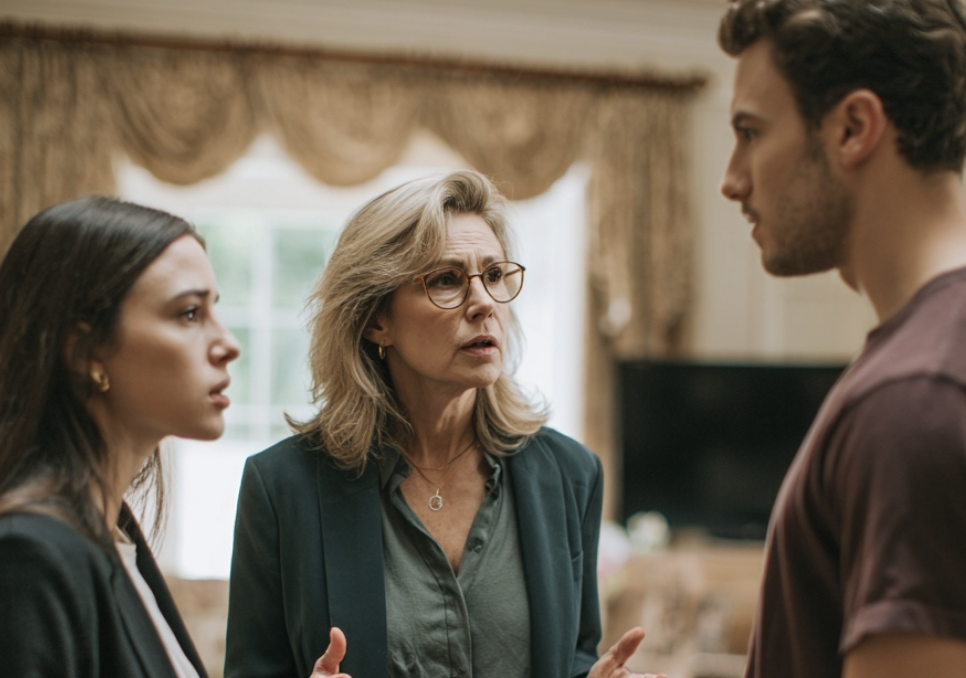Svetlana stood by the stove, silently stirring the soup. Steam from the pot hit her face, and her eyes stung not only from the onions. She no longer heard exactly what her husband was saying — the usual tone, the usual intonation: irritation, dissatisfaction, reproach. Lately, Vadim seemed to be looking for any excuse to criticize her.
“I told you no potatoes!” — his voice cut through the kitchen like a scream in the silence. — “My stomach feels heavy from them!”
“There are only a couple of pieces,” Svetlana said calmly, without turning around.
“I don’t care how many! I asked! Is that so hard for you?”
She bit her lip. Whatever she did, it was never right. Just everything. Not the right food, not the right words, not the right walk, not the right look.
Vadim used to be different. Smiling, attentive, a little shy. Five years ago, she fell in love with him like a girl. He knew how to speak beautifully, how to listen, brought her coffee in bed. And then — as if someone switched off the light.
The first warning sign was when she quit her job at his request. “Why do you need that accounting job? I’ll provide. I don’t want you just in the kitchen and at home. Want children? Then focus on the family.” Back then, Svetlana thought — maybe he was right. She’d rest and then return. She never did. And then everything started to unravel.
Her mother-in-law, Tamara Petrovna, lived in another city. She visited rarely, kept to herself, was neutral. Svetlana felt no special warmth toward her, but there was nothing to complain about either — the woman didn’t interfere, didn’t impose, called seldom. Her son was her pride, and she often repeated, “The main thing is that Vadim is satisfied. Then everything is in order in the family.”
And now Vadim was “satisfied” with everything so much that Svetlana woke up anxious and went to bed feeling guilty.
“Well? Are you going to fix the soup, or should I cook something myself?”
“Do as you wish,” she replied quietly.
“Have you completely lost it?”
He moved sharply toward her, and at that moment the door in the hallway slammed.
“Mom!” Vadim exclaimed in surprise. “What are you doing here?”
Svetlana flinched. She didn’t even know Tamara Petrovna was coming. A wave of shame immediately hit her. What would she hear now? “Lazy wife,” “can’t even feed a person,” “spoiled”…
But Tamara Petrovna, seeing her daughter-in-law’s face, stopped, put down her bag by the door, and looked carefully at her son. Then she shifted her gaze to the stove.
“I stopped by on the way. Our school has an anniversary — they invited former teachers. So I decided to spend the night here. You don’t mind?”
Vadim froze. He wasn’t happy about the visit but didn’t want to argue with his mother.
“Well, if you had called in advance…”
“I purposely didn’t,” she smiled gently. “I wanted to see you in a natural setting. So I did.”
Svetlana wanted to say something, to justify herself, but her mother-in-law raised a hand:
“No need for words. I’ll go wash my hands. And you, Vadim, calm down. We’ll talk tonight.”
Vadim silently left the kitchen, slamming the bedroom door behind him. Svetlana stood rooted to the spot. For the first time in many months, someone was there at the moment when the real life happened — not the pretty picture, not a public smile, but this — her real, suppressed life.
That evening, her mother-in-law sat in the kitchen drinking tea. Svetlana cleaned the dishes, feeling anxiety growing inside. Vadim went to his friends without saying goodbye.
“Does he often yell at you?” Tamara Petrovna suddenly asked, not looking at her.
Svetlana froze, clutching a plate.
“Sometimes…” she answered.
“No. Often. I saw how he looked at you. That’s not irritation. That’s a habit of domination.”
Svetlana sank onto a stool. Her hands trembled.
“I don’t know what to do… I can’t leave. I have nowhere to go.”
“Everyone has somewhere. The question is when.” Tamara Petrovna took a sip of tea. “I’ve always tried to stay out of it. Not interfere. Thought if my son is happy — that’s enough. But he’s not happy. He became like his father.”
Svetlana looked at her mother-in-law in surprise. She had never heard her talk about her husband before.
“His father never raised a hand but destroyed her morally. Extinguished her. I had nothing left in my eyes. I lived with him for twenty years — for the child. And then, when Vadim went to study, I left. And finally exhaled.”
Svetlana listened as if swallowing air.
“You know what’s the worst?” her mother-in-law continued. “I was silent. And now I see my son became the same. And I won’t be silent anymore.”
That night, Svetlana barely slept. She remembered every moment she endured, swallowed humiliation, justified Vadim to herself. Everything seemed too long, too thick, like she was drowning in her own thoughts. But in the morning, for the first time in a long while, she woke up thinking she was not alone. That someone saw. And didn’t turn away.
Tamara Petrovna was already in the kitchen. Neat, in a light robe with her hair carefully done — she stirred oatmeal in a pot and calmly examined the stove. Seeing her daughter-in-law, she nodded:
“Good morning. You didn’t sleep well.”
“Sometimes,” Svetlana smiled awkwardly. “I’ll make something now.”
“Everything is ready. Have breakfast.”
Sveta felt like a guest in her own home. But there was no awkwardness — only slight amazement. The softness and care of this woman, so strict and distant before, seemed to cut her from the inside.
“Thank you…” she said quietly, sitting at the table.
“I’ll talk to him. But you have to understand: don’t live if every day is a ‘fight for survival,’” said her mother-in-law and sat opposite. “I’m not urging a divorce, don’t misunderstand. But you must not be a ‘silent victim’ anymore.”
Svetlana was silent, absorbing every word.
Vadim returned after lunch. Hungover, irritated. Complaining about noise in the stairwell, he threw his jacket on a chair, opened the fridge, and grumbled loudly:
“Where’s the food?”
“In the pot,” Sveta answered calmly. “Heat it up.”
He glanced at her with displeasure but stopped when he saw his mother behind her.
“Oh, mom, you’re still here?”
“And you thought I’d run away?” Tamara Petrovna answered calmly. “I’m staying for a couple of days. Want to see how you live.”
Vadim looked at Sveta — the usual way. Defiantly. But this time she didn’t lower her eyes. Just stepped slightly back from the table and stood up.
“I’m going for a walk. Just a bit.”
“And who will wash the dishes?”
“You.”
Silence. He opened his mouth to say something, but his mother abruptly stood up.
“Don’t you dare humiliate her!” Tamara Petrovna’s voice was quiet but cold as steel. “I see everything, Vadim. And I won’t be silent anymore.”
He straightened as if struck.
“Mom, you don’t understand. This is between us. You’re interfering where you shouldn’t…”
“You live like your father. With complaints, accusations, and the feeling that everyone owes you something. She owes you nothing. She’s your wife, not a servant.”
“Am I ‘beating’ her or something?”
“You don’t have to hit to kill from inside,” the mother replied firmly. “I was silent once. You remember well how I lived with your father. I won’t do that anymore.”
Svetlana stood in the hallway, unable to move. It was as if she were frozen. She heard every word. And couldn’t believe these words were spoken in her defense.
“Mom, you yourself said: the main thing is that I’m satisfied…”
“I was wrong. If you’re satisfied while the person next to you fades away — that’s not joy, that’s tragedy.”
This time Vadim was silent. Didn’t snort, grumble, or brush off. Just sat down and stared into space.
Svetlana quietly stepped onto the landing. The air burned her cheeks — not from cold but from strange relief. Something had finally shifted.
That evening, Tamara Petrovna came into her room and placed a small stack of bills on the nightstand.
“It’s not much, but enough for the start. Take it. I mean it. If you decide to leave — I’ll help.”
“You… really…” Sveta was breathless with emotion. “I didn’t ask…”
“But you thought about it,” the woman smiled gently. “I was blind. Now I want to be there. For you. And for your grandchildren, when you have them. But not in such a family. Not under these conditions.”
Svetlana pressed a handkerchief to her lips and closed her eyes, crying. Not from offense, not from pain — from relief. For the first time in her life, an adult saw, understood… and took her side.
“Don’t rush your decision,” Tamara Petrovna said quietly, stroking her shoulder. “Just remember: you are no longer alone. If that moment ever comes — call me. Without shame. Even if it’s night.”
Sveta only nodded, unable to say a word. She had carried this silence inside for many years. Now someone had heard it. That was enough to straighten her shoulders inside.
Three days later, her mother-in-law left. Before leaving, she hugged her daughter-in-law tightly and, to her own surprise, whispered:
“Take care of yourself. If not you — no one will.”
Vadim walked around sullen all that time. Didn’t argue with his mother, but didn’t approach Svetlana either. No explanations, no apologies — as if he was just hiding.
On the fourth day, it burst out.
“All right,” he started loudly from the doorway. “Enough! Am I a husband or not? How long will this continue?”
Svetlana came out of the room and calmly stood against the wall. She looked at him not as before — from below up, guilt-ridden. But straight on. Straight in the eyes.
“And what exactly should ‘stop continuing’?”
“You’ve changed… You answer back. You walk like you’re the owner here, not us together. Is this all because of your mom?”
“No. Because of you.” She paused. “Or rather, because of how you’ve treated me all these years.”
“Of course,” he sneered. “I’m the monster, and you’re the ‘poor victim.’ And I fed you, gave you drinks, supported you. Where’s the gratitude?”
Svetlana was silent again. He expected her to flare up as usual, to justify, to squirm. But she just stood stubborn, restrained — and he began to get angrier.
“So that’s the real you. Got some support and kicked back. You think if your mother said a couple of kind words, you’re now a star?”
“No,” Sveta answered. “I just remember who I am now. And I won’t let you trample me again.”
He sighed with annoyance.
“You think I humiliate you?”
“I know you do. For years. And if you don’t see it — that’s not my problem.”
“Who are you without me?!” he exploded. “Nobody! You were a gray mouse and will stay one!”
Svetlana didn’t flinch. She stood calmly. Not because it didn’t hurt. But because she was no longer afraid of pain. Pain had become an old acquaintance — not frightening, but predictable.
“If I’m ‘nobody,’ why do you lose it? Afraid ‘nobody’ will leave, and you’ll be alone?”
“Will you leave? Where will you go?”
“I’m not obliged to answer now. But know this: if I leave — I won’t call you to come back. And you won’t know where I am.”
Vadim cursed, slammed the bedroom door, and stayed there for several hours.
The next day, he was restrained, almost polite. Washed the dishes, suggested going to the store. Even bought her a chocolate bar.
Svetlana took the bar, looked at it, and put it on the table. Didn’t turn away, didn’t make a scene — just didn’t accept the gesture, which had no repentance behind it. Only fear of losing control.
He understood this. And as if realized that the old methods didn’t work. New ones began. Subtle.
“Well, you’re not perfect either, Svet. How many times did I come home and dinner was cold? Or you’re always on the phone. I tolerated it.”
“You didn’t tolerate. You thought you were above.”
He smirked:
“You’re just crazy. Female thing. Your mom spoiled you. Supported you, and you imagined you were great.”
“No,” Svetlana replied softly. “I just believed for the first time that I deserve respect.”
He snorted and left.
A week later, Sveta opened her laptop and visited a job website. She hadn’t updated her profile for a long time, but now she did. Checked the box: “Ready to work.” Filled in “expected salary.” Honestly wrote what she could do.
The interview was the next day. A small company, cozy office, polite director. She was nervous, hands trembling, but her voice was firm. Nine years of experience — not a joke.
Two days later, she got a call. She was hired.
She came home with the documents and said:
“I start work on Monday.”
“What?!” Vadim turned pale. “Why? I provide for you!”
“But I don’t want to be dependent anymore.”
He sat down as if hit.
“It’s all because of her. Because of your mom. She’s been poisoning your head.”
“No, Vadim. She didn’t poison me. She opened my eyes.”
He stood up slowly, as if struggling with himself.
“Are you sure? Is this the end?”
“No,” Svetlana said. “It’s a comma. But only if you hear me. If not — then a full stop.”
He went out on the balcony and smoked for a long time. She sat in the room and for the first time in a long time thought not about what she feared, but about what she wanted. And knew — everything is just beginning.
The job became a breath of fresh air for her. The office was modest but cozy, the team friendly, and the boss polite and restrained. No one shouted, mocked, or demanded “reports down to the last penny.” Here she felt needed again. Her brain quickly switched to work rhythm, her fingers remembered how to handle numbers, programs, reports. Svetlana blossomed every day.
She received her first paycheck in two weeks — an advance. And instead of giving it all to Vadim as before, she bought herself — hand cream and a new warm coat, modest but beautiful. When she brought the bags home, Vadim stood in the doorway, puzzled.
“Did you buy all this?”
“Yes.”
“With your own money?”
“Yes.”
He pressed his lips.
“You could have asked first. We’re a family.”
“Family is support. Not control,” she replied quietly and walked past him.
He was silent. But in the evening he still came over:
“I guess I overdid it. We fought, yeah… But I tried. We had good moments.”
“We did,” Svetlana nodded. “But you didn’t notice how I was getting worse. I asked — and you thought it was whimsy.”
“Maybe we can try again? Since you’re working now, maybe I’ll think about how to behave differently…”
Svetlana looked at him for a long time. He was confused, insecure, nothing like the one who used to command their home. But also not someone she wanted to go on with.
“Vadim, I don’t want to start over. I want something different. Without fear. Without humiliation. With respect. And if you’re really ready to change — start with yourself. No promises, no conditions.”
He sighed heavily as if realizing how much was lost.
“It’s… hard for me to accept.”
“For me, it was hard to live when every day was like an exam.”
Tamara Petrovna called often. Asked not only about her son but specifically about Svetlana. “How do you feel? How’s work? Is the coat warm? Any news?”
Sometimes Svetlana found herself smiling into the phone.
Once, her mother-in-law called and said:
“I found a small fund that helps women who went through a ‘difficult period.’ Maybe you could go there? They have a good psychologist. Just to talk.”
Sveta agreed. Not immediately. Hesitated. But she went. And the conversation with a stranger became a revelation: someone who didn’t know her personally just listened and didn’t interrupt. Didn’t give advice, didn’t blame, didn’t shift guilt. Just listened. And that helped the most.
In spring, Svetlana rented a separate room. Small but cozy, with windows overlooking a park. Vadim still hoped it was temporary. Called, wrote, came over. Once — even with flowers. But Sveta no longer sought the old. She found something new — respect for herself.
She didn’t rush to file for divorce. Just lived separately. Worked. Paid for utilities herself. Didn’t ask permission, didn’t explain, didn’t justify.
After a month, she filed for divorce. Calmly. Without scandal. Just a document — like a period. Not revenge, not anger, not hysteria. A decision.
Vadim didn’t believe it until the last moment. He came on the day she took the rest of her things, sat on a stool in the kitchen, and said:
“You’re really leaving?”
“I already left.”
“I thought… you’d come to your senses.”
“I thought you’d change. But you took too long thinking I owed you everything. I owe no one anything anymore.”
He nodded. Without malice. Truly confused. Then quietly added:
“Mom was right. I became like my father.”
“But you have a chance to be different. If you want.”
Svetlana moved out for good in the summer. Got a promotion at work — now she managed a separate department. Her boss said, “You know how to keep balance. That’s rare.” And she just smiled — because she knew at what cost she had learned.
Tamara Petrovna came to visit. Brought gifts, discussed news with Svetlana, watched movies with her, and left with a light smile.
“I’m proud of you,” she said once when leaving. “I used to think you were too soft. But it turned out you’re stronger than all of us combined.”
Svetlana hugged her and whispered:
“Thank you for standing between us once. It changed everything.”
Now the most important thing in her life was respect. For herself. And for those around her. Everything else would follow. And no voice would ever make her doubt herself again.



